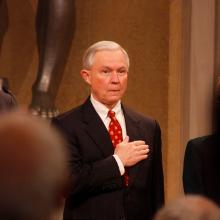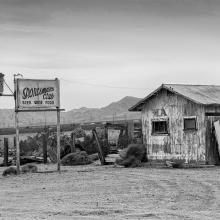Opinion
Salvation cannot remain an individualized spiritualized concept. When the psalmists called out for salvation, they meant salvation from present suffering and danger. When the crowd shouted “Hosanna” at Jesus’ arrival in Jerusalem, they weren’t referring to the afterlife. When we talk about salvation in the context of our warming climate, we mean deliverance from the most destructive force our species has ever faced. When it comes to climate change, we have to think about community and salvation in a global sense. We must start to recognize that our communities are mutually dependent upon each other.
The purpose of the episode is not merely to introduce an autistic character, but to show how people with differing abilities can become friends. Sesame Street gently demonstrates the patience and empathy that make up the building blocks of any healthy relationship. It deftly navigates the misimpressions neurotypical children might have when they encounter an autistic person for the first time and shows that a little understanding goes a long way toward making a lifelong friend. When Big Bird first encounters Julia, he mistakes her unresponsiveness to him as a personal dismissal. He must learn that she takes her time answering, particularly when she’s deep in concentration on another activity. While he notices that she does things differently, he soon comes to realize that Julia’s way to play can be a lot of fun.
In the same-sex marriage discussion, people cite 2,000 years of church history to support their suspicions of affirming theology. But this same history offers plenty of examples of healthy theological shifts that actually counter tradition. Healing on the Sabbath went against thousands of years of history. Replacing circumcision with baptism went against thousands of years of history. Even the Reformation went against 1,500 years of history, with the Reformers’ claim that they better understood the church fathers than the church did. History reveals that the church is always learning, always engaging in a re-examination of core values.
Sincere love during these times means offering sanctuary for the sojourner, risking our congregations, and even putting our bodies on the line — knowing that our true citizenship is in the Kingdom, where no one is illegal and all are loved.
It is crucial for Christians to be involved in this march and supportive of science. Our orientation to the world is to care for all creation, human and non-human. Science, when done humbly and rigorously, recognizing our creaturely place in creation, and seeking understanding over control, enables us to more fully care for the world and draw closer to God. The march for science is an opportunity to stand in solidarity with scientists whose work helps us better understand the world and care for the oppressed.
Divine creativity is one of the things we share with our creator. It is woven into our DNA. We’re active participants in the continuing story of creation whether we like it or not.
The sanctuary, designed by Newman Architects of New Haven, Conn., provides a space for sharing, a place for those from different faith traditions, values, and cultures to meet and engage in dialogue, and to nurture the Lynn University community.
3. March for Science. And Climate.
This weekend is the March for Science. Next week is the People's Climate March. LISTEN to our audio short, where we have a serious chat with scientists about religion. Then WATCH our video short, where we very non-seriously contemplate whom we might meet at the Climate March.

Jeff Sessions in 2009. Photo by Ryan J. Reilly / Flickr.com
While President Donald Trump has been stymied on many fronts — the legal challenges to his refugee ban, the defeat of the AHCA, and the complete lack so far of any legislative accomplishments — Jeff Sessions is firmly in place as the nation’s top law enforcement officer. And he has been busy.
Sister Joan Chittister opens her latest book with the story of Abba Zosimas, a fifth-century monk in Palestine. Abba Zosimas taught his followers, “The soul has as many masters as it has passions.” Chittister wants her readers to look “gently, kindly but clearly,” at those masters and passions in their lives, she said.
Yet the overall message of the New Testament, especially the book of Acts, is that the church is not a separate community with its own culture. The power of Christianity is found in what scholars of mission call its capacity for contextualization, which means that the message of Christ can be translated into different languages, cultures, and contexts.
Paschal pardon here exemplifies a miscarriage of justice for one of the prisoners. The custom condemns Jesus, whose guilt is dubious. Ultimately, Jesus divinely conquers the unjust system at hand when he walks freely among his disciples in the flesh, three days after he is crucified as a criminal. But the possibility of a triumphant erasure of crime in the U.S. is limited. Constitutionally, the president can offer clemency — or “leniency” — for any federal offense, aside from cases involved with impeachment, by two methods: commute, which lessens the sentence but retains civil restrictions like the loss of the right to vote, or pardon, which eliminates the sentence entirely.
The world around me was constructed to, more or less, accommodate my faith.
But many Muslim students cannot take for granted what I, as a Christian, was able to take for granted.
Recently, in a letter to the Frisco Independent School District, the Texas attorney general’s office raised concerns about the constitutionality of a Muslim prayer room at Frisco’s Liberty High Schoo,l based on the establishment clause of the First Amendment.
The people writing, preaching, and claiming to know how to interpret "the" truth were almost entirely cisgender heterosexual white men in positions of authority in religious communities.
The resurrected Jesus is recognized not by his words but by his wounds, the wounds of his crucifixion. Herein lies a great irony. The crucifixion has left its indelible marks upon the resurrected one, such that the risen Jesus is recognizable only through them. On the one hand, resurrection has not erased his wounds. On the other hand, Jesus’ wounds no longer define him as a dead criminal, as determined by the state. Jesus doesn’t wince at Thomas’s touch. Even as his wounds remain, Jesus’ body is made whole and new.
Restoration and reconciliation with God is the ultimate goal. It is the incarnate Jesus who provides the way back for humanity to be restored and reconciled to God. This is the essence of the Christian faith.

Image via Kendrick Lamar Facebook
For what the singer/songwriter/music producer Pharrell said two years ago about Kendrick Lamar is absolutely true. Kendrick Lamar is the Bob Dylan of his generation, an American storyteller on the same plane as Toni Morrison, Eugene O’Neill, Pearl S. Buck, and other U.S. Nobel Prize in Literature laureates. Why this statement may seem overblown is because of highbrow bias against hip-hop, which is to say bias against black language, black storytellers, black people. But, to quote Chuck D, the leader of the rap group Public Enemy, hip-hop is “CNN for black people.” And Lamar is the best reporter in the business.

Abandoned diner along highway The Grapes of Wrath's "Mother road," Route 66 in Mojave desert on April 6, 2010. Rolf_52 / Shutterstock.com
Seventy-eight years ago, John Steinbeck published The Grapes of Wrath. It’s since become a staple in high-school curricula, offering a glimpse into our nation’s troubled history. But its lessons are just as applicable today in our hyper-polarized climate, in which empathy is often found lacking.
There was something about you there on that cross, that Good Friday.
There was something about your body there, about your manner.
Irony of all ironies, you were the “Son of God,” sent back to God by crucifixion.
Submissive obedience is deeply embedded in Christian theology. The origin of sin is attributed to Adam and Eve’s disobedience in the garden. Jesus, by contrast, is described as “obedient unto death” — an example we are taught to emulate. God is depicted as all-powerful, all-knowing, a king and lord and father with relentless control over all things. And we — broken, limited, and prone to mistakes — are meant to trust God in all things, and give ourselves over completely to God’s divine power. This call to submissive obedience is exemplified, more clearly than anywhere else, in Jesus’ willing submission to torture and death on the cross.
Good Friday is an invitation for us, every year, to ask: What is actually good about Jesus’ death on the cross? What about it is salvific, and what is it saving us from?















